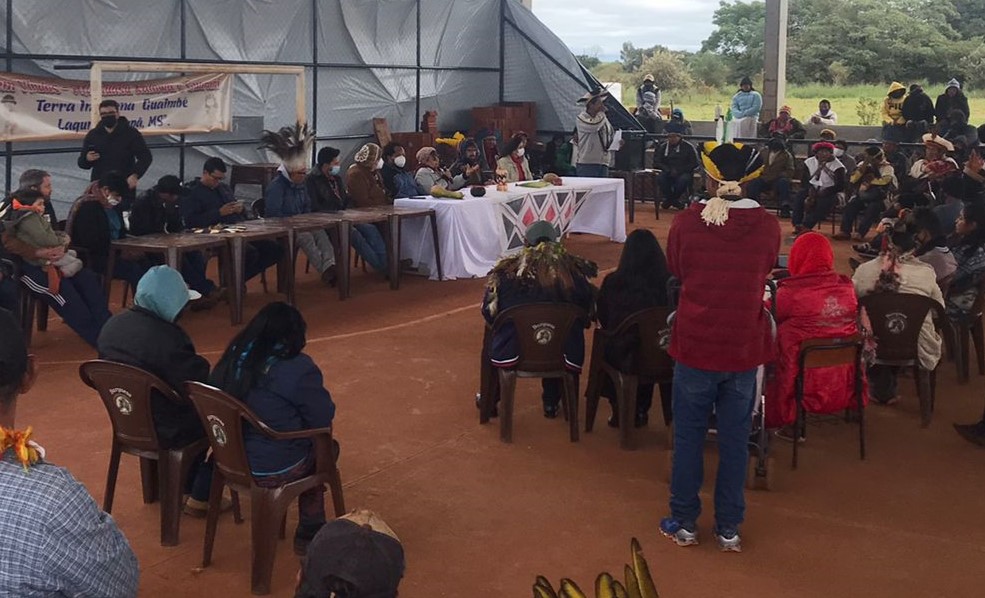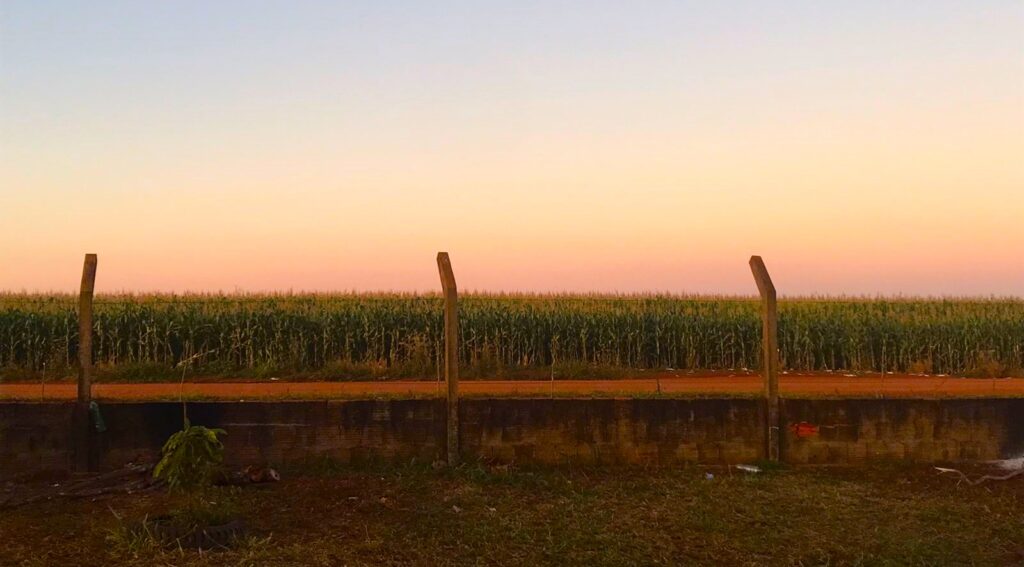If you are concerned with the destruction of the climate by extractive industries, look no further than the reality faced by the Guarani and Kaiowá peoples in Mato Grosso do Sul, a state in the heart of Brazil’s agribusiness.
Their situation lays bare what might become of the Amazon and its defenders if it continues to be subjected to the capitalist destruction enacted by agribusiness, mining, and illegal logging that was rampant under the recently defeated Bolsonaro government. The national Indigenous organization Articulação dos Povos Indígenas do Brasil (APIB) outlined in an open letter what was at stake and why defeating Bolsonaro was so important.
In many ways, the Guarani and Kaiowá are already living a dystopian future–cornered in reservations or on their land by private and public security forces, they witness the forest give way to large stretches of pesticide-fueled soybean, corn, and sugarcane monocultures. Nonetheless, the Guarani and Kaiowá resist and keep fighting for the right to live on their ancestral land – a struggle they have been paying for with their lives and personal security.
In May 2022, EarthRights traveled to the traditional territory of the Guarani and Kaiowá to participate in a meeting convened by the Aty Guasu Council, which brings together political and religious leaders and members of Guarani and Kaiowá communities living throughout Mato Grosso do Sul. The Aty Guasu meets periodically to discuss the problems that affect the lives of the Guarani and Kaiowá peoples, outline strategies to confront the violence and disrespect for their territorial rights, and conduct dialogues with other Indigenous peoples and organizations allied in this struggle. Stepping on the ground that the Guarani and Kaiowá people are fighting for, sharing their food, and listening to their stories was a deeply impactful experience.

Dispossessions, retomadas, and the organized violence of agribusiness
The Guarani and Kaiowá are two of the largest Indigenous groups in Brazil and have occupied the south of Mato Grosso do Sul since time immemorial–they constitute two distinct peoples, the Guarani-Ñandeva (or simply “Guarani”) and the Guarani-Kaiowá (or simply “Kaiowá,” or “Paĩ Tavyterã”). Policies for the expulsion of Guarani and Kaiowá peoples from their lands were promoted by the Brazilian State after the Paraguayan War (1964-1870) and intensified in scale and violence during the 1950s and 1960s, ensuring the takeover of vast expanses of traditional territories by private capital that converted the once-diverse ecosystem into large cattle ranches and monoculture plantations of soybeans and corn.
Throughout this decades-long process of displacement, many Kaiowá and Guarani communities and families were confined to Indigenous reserves created by the government, while others remained scattered outside their traditional territories, at times forced to work for those who had stolen their land and financed the death of their parentes (“relatives”). Faced with the threat to cultural and physical survival represented by the expulsion and non-demarcation of Indigenous lands and the constant armed violence sponsored by the State and agribusiness, in an assembly at the end of the 1970s, the Guarani and Kaiowá decided to intensify the struggle for the right to live in their tekoha – “the place where one is” in Guarani. This included the retomadas (“repossessions”) of ancestral land, a strategy of self-determination and self-demarcation through the reoccupation of their lands, to guarantee physical, cultural, and spiritual survival and to pressure the Brazilian state to fulfill its long overdue constitutional obligation to identify and demarcate Indigenous lands.

The Brazilian Federal Constitution, which came into effect in 1988, recognized that Indigenous peoples have a fundamental right to the lands they have traditionally occupied and established a deadline for the State to demarcate all Indigenous lands in the country. This demarcation, however, has still not occurred for the majority of Indigenous lands, and the prospect of it happening decreased during the Bolsonaro presidency, which unabashedly tried to dismantle policies aimed at protecting the environment and Indigenous rights.
As several ancestral lands have been bravely retomadas by the Guarani and Kaiowá throughout the years, agribusiness has responded by increasing the level of violence, using public and private security forces to attack the communities. One of the most infamous was the 2016 “Caarapó Massacre,” when over 100 people in about 40 pickup trucks and three-wheel loaders invaded a retomada of Guarani and Kaiowá peoples, killing 23-year-old Indigenous health worker Clodiodi Aquileu Rodrigues de Souza. At least six other Guarani and Kaiowá people were wounded by firearms and hospitalized, including children.
Between 2000 and 2016, the Guarani and Kaiowá suffered at least 24 direct attacks in Mato Grosso do Sul, in episodes that included homicides, forced evictions, attacks with firearms, torture, assault, threats, arson, forced disappearances, kidnappings, sexual violence, and chemical attacks through the spraying of pesticides from aircrafts. The vast majority remain unresolved.
At the request of the Public Prosecutor’s Office in charge of investigating these accounts of violence against the Guarani and Kaiowá, scholars have conducted research that concludes that these episodes amount to crimes against humanity. In 2021, Mato Grosso do Sul had nearly the highest rate of Indigenous suicides and murders, second only to Amazonas, and experienced the highest number of cases of sexual violence against Indigenous peoples. Apart from direct attacks and violence, the violation of the right to ancestral land directly impacts the Guarani and Kaiowá’s food security and sovereignty, resulting in severe malnutrition.
Indeed, in only six months since we left Mato Grosso do Sul, a series of events demonstrates the gravity of the systematic violence against the Guarani Kaiowá:
- On May 21, an 18-year-old Kaiowá named Alex Recarte Vasques Lopes was murdered while going out to look for firewood–a case that holds strong similarities with the 2013 murder of 15-year-old Denilson Barbosa by a rural landowner when the boy was out fishing with family members.
- In response to the brutal murder of Alex, the community of the Taquaperi Indigenous reserve decided to repossess the farm where he was murdered, which was built on Indigenous ancestral territory, to reclaim the land and demand a federal investigation of the case. Since then, the community began to suffer daily attacks from private security forces, police, and farmers. On June 24, military police invaded the area without a court order to forcibly evict the Guarani and Kaiowá peoples, firing rubber bullets and live ammunition, leaving at least nine injured and one dead – Vitor Guarani Kaiowá, 42. The episode was known as the Guapo’y Massacre.
- On July 14, three Indigenous leaders who had survived the Guapo’y Massacre and were still fighting to repossess the territory were ambushed, and Indigenous leader Marcio Moreira was murdered.
- On September 14, another Indigenous leader, Vitorino Sanches, who had survived an assassination attempt in early August, was shot and killed by gunmen in the same region.
This siege against the Guarani and Kaiowá might give the impression that their claim for territory entails a large-scale take-over of state land. However, the Guarani and Kaiowá are asking for the demarcation of about 700 thousand hectares of land, which represents only two percent of the total area of the state of Mato Grosso do Sul. But agribusiness won’t budge an inch.
The marco temporal thesis and the Supreme Court
In addition to resisting and fighting for their land and human rights, the Guarani and Kaiowá are also attentive to the Brazilian Supreme Court’s next move. The court is scheduled to decide a case that has already been postponed a number of times, and that could greatly affect the territorial rights of Indigenous peoples. The case hinges largely on the marco temporal thesis (“landmark” or “milestone” thesis). This thesis, pushed by agribusiness, urges a narrow interpretation of the Brazilian Federal Constitution that restricts the demarcation of Indigenous lands only to those areas that were under proven possession of Indigenous peoples on October 5, 1988, when the Constitution was enacted.

In practice, this means that an Indigenous community that had been expelled from their land by 1988 must prove that an application for reoccupation was at that time pending before the Brazilian judiciary. This burden of proof is extraordinarily difficult to meet, especially considering the systemic lack of access to the Brazilian judicial and political systems that Indigenous people have faced in Brazil and the intense violence waged against Indigenous peoples. Until 1988, for example, Indigenous people were under the guardianship of the National Indian Foundation (FUNAI) and not even entitled to access the judiciary by means of their own representation. That is why Brazil’s Indigenous peoples, human rights movement, and large sectors of society argue to defend the correct and well-established interpretation of the Constitution that Indigenous ownership of the land is original, that is, prior to the creation of the Brazilian state itself.
The stakes are extraordinarily high since a ruling in favor of the marco temporal would be an unprecedented incentive for land-grabbers, miners, loggers, and anti-Indigenous groups, meaning more threats to earth rights defenders, destruction of extraordinarily diverse biomes, and the aggravation of the climate crisis. Human rights defenders and movements worldwide must join forces with the Indigenous peoples of Brazil to oppose the dangerous legal argument supported by agribusiness and with the Guarani and Kaiowá to demand a halt to the large-scale violence in Mato Grosso do Sul and the urgent demarcation of their ancestral lands.
We stand in solidarity with the Guarani and Kaiowá peoples and with all Indigenous peoples and traditional communities in Brazil. As the national Indigenous organization APIB says, it’s a struggle for life.
For more information on the Guarani Kaiowá and the Indigenous movement in Brazil:
- Articulação dos Povos Indígenas do Brasil: https://apiboficial.org/?lang=en
- Conselho Indigenista Missionário: https://cimi.org.br/
Contact:
Cecilia Vieira- Staff attorney of Amazon Program
cecilia@earthrights.org






